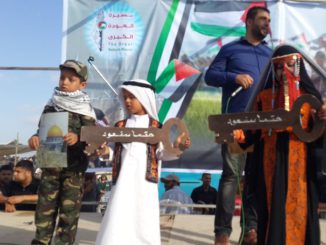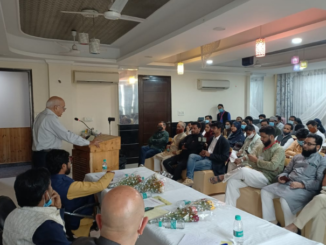
By Jeremy Salt
The past few weeks have been a very gratifying time for the colonial-settler regime in Palestine. Hamas and Hezbollah have been listed as terrorist organizations by the UK and Australian governments, a new ‘’trade and defense’’ pact has been initialed by the UK and Israel and a similar agreement signed between Israel and Morocco covering ‘security,’ intelligence-sharing and ‘‘future arms sales.’’
The broader Arab world context for this last agreement is the 2020 decision by Morocco, the UAE, Bahrain and Sudan to ‘normalize’ relations with the Zionist state: the Trump administration rewarded Morocco by supporting its claim to Western Sahara, against the international consensus that its status should be resolved by referendum.
Apart from these arrangements with Arab governments, Israel has been continuously strengthening commercial, military and strategic relations with Greece and the government of southern Cyprus: what is gradually taking shape is a new vector of operations in the eastern Mediterranean, threatening to the short and long-term commercial and strategic interests of Turkey and adding a new dimension to the military threat to Syria.
In 2017 Israel unilaterally expanded its “exclusive economic zone” in the eastern Mediterranean. Coastal waters (22.2 km), what is called a ‘contiguous zone’ (22.2 km) and its ‘exclusive economic zone’ (22,000 sq. km) give it authority over 26,000 sq. km of the eastern Mediterranean. This block of water extends 203.7 km out from the coast in the south and 129.6 in the north and is adjacent to the enormous EEZ declared around Cyprus, including the Turkish north.
In March 2021, Israel, Greece, Cyprus and France staged naval war games aimed at meeting “challenges and threats” in the eastern Mediterranean, according to a Greek naval spokesman. In April, Greece and Israel established a joint air force training center in Greece. Arms sales and training by Israeli troops in the mountains of southern Cyprus, aimed at combat with Hezbollah, because the terrain is similar to southern Lebanon, are also involved in the steady consolidation of this multilateral collaboration. In November 2021, the UAE, Bahrain, Israel and the US held joint naval exercises in the Red Sea, and of course, the US has a string of air and naval bases down the Persian/Arabian Gulf as well as the Diego Garcia naval base in the Indian Ocean. Steadily, from the eastern Mediterranean down to the gulf, the noose is being tightened around the Middle East’s ‘axis of resistance.’
‘IDQ’ – Hamas’ Izz al-Din al Qassam Brigades – were listed by the UK government as a terrorist organization by the UK government in March 2001 but now, as of late November 2021, the organization has been proscribed in its entirety. Under the Terrorism Act of 2000, the UK government defines terrorism as the use or threat of action involving serious violence against a person; serious damage to property endangering a person’s life (other than that of the person committing the act); creating a serious risk to the health or safety of the public or a section of the public; or an act designed seriously to interfere with or seriously disrupt an electronic system.
On this basis it is now a criminal offense in the UK to belong to Hamas; to invite support for it (support defined as meaning moral as well as material support such as cash donations); to express a belief or opinion that is supportive of Hamas (this would naturally have to include the spoken as well as the published word); arranging or managing (or assisting in arranging or managing) a meeting in the knowledge that it has been called to support or further the activities of Hamas; wearing clothing or displaying articles in such a way as to arouse ‘’reasonable suspicion’’ that the individual wearing the clothing or carrying the flag is a member of Hamas; and publishing an image of an item of clothing or other articles such as a flag or a logo (most likely on a T-shirt) that indicates support for Hamas.
The penalty for these offenses ranges from a prison term of 14 years down to a six-month jail term and a 5000 pound fine for lesser offenses such as displaying a Hamas logo on an item of clothing or carrying a Hamas flag. These prescriptions are extra-territorial, which means that any UK citizen found guilty of committing abroad that are regarded as crimes under British law can be prosecuted on return to the home country.
The justification for listing Hamas as a terrorist organization, according to the Home Office is that Hamas had very recently killed a Jewish settler in Jerusalem and had launched indiscriminate rocket attacks against Israeli targets. In May 2021, according to another example given by the UK government, Hamas fired 4000 rockets into Israel, killing two children. Hamas has also frequently floated incendiary balloons across the Gaza fence, starting fires at settlements in southern Israel that have resulted in damage to property.
Before making the necessary comparisons between the damage done by Hamas rockets and incendiary balloons and the damage done by Israeli missiles in May 2021, there is perhaps a need to return to the UK government’s own definition of terrorism and apply it to the extreme violence directed against other countries in recent years by the UK and its allies, either directly (as in Iraq) or through armed proxies (as in the cases of Libya, Syria and Yemen). All of its own definitions of terrorism apply, including various forms of support for terrorist groups, actions involving serious violence to a person (or persons) and risks to the health and safety of a population or part of a population.
Israel has fallen into this category, obviously, for the last seven decades, France and Britain for much longer, and France, Britain and the US in the past three decades, in their wars on Iraq and Libya, and their proxy wars on Syria and Yemen. In their war on Iraq in 1991, they killed hundreds of thousands of Iraqi civilians, many thousands of them children: the estimates begin at about 200,000 and go up to more than a million.
The logic of the war was ‘the enemy as a system’ which meant that the attacking armies deliberately targeted civilian infrastructure, including roads, bridges, highways, sewage works and electricity and water supply plants. The destruction of civilian facilities was the cause of indirect death of many Iraqis, especially children and especially the very young. The WHO (World Health Organization) said Iraq’s health system had been set back 50 years. By 1998 infant mortality had risen from 40 per 1000 births in 1990 to 103 per 1000 births; under-five mortality from 50 per thousand children to 103 per thousand.
In the decade of sanctions which followed, applied and upheld to the bitter end by the UK and the US, the number of dead steadily rose, along with the number of wounded, the maimed for life, the babies damaged in the womb by the use of depleted uranium bombs and the millions of Iraqis who fled their shattered country, constituting the greatest refugee problem since Palestine in 1948 (until the attack on Syria).
Again, there is no consensus on the number of Iraqis who were killed or died as the result of sanctions but a starting point for estimates is the Lancet’s 601, 027 violent deaths out of 654, 965 excess deaths. Other figures rise to more than a million civilian, with hundreds of thousands of children among them. It is scarcely any wonder that UN humanitarian coordinators described these sanctions, designed and applied by governments now telling us who are the terrorists, as genocidal.
Saudi Arabia, supplied with armaments by the UK and the US, launched its war on Yemen in 2015, with civilian infrastructure high on the list of targets of its air force. In December 2020, the UN put the number of dead, including tens of thousands of children killed in missile attacks or dying of other causes related to the war, at 233,000; by now this figure has certainly increased to 250,000 or more.
In June 2019, embarrassed by the civilian death toll, the UK government banned weapons sales to the Saudi government. However, it lifted the ban on February 9, 2021, and between July and September, this year authorized the sale of $1.9 billion worth of arms to the Saudis, with missiles and bombs accounting for $1.88 million of this amount. The British ban was lifted the day after President Biden announced an end to all US support for ‘’offensive operations’’ by the Saudis in Yemen including ‘’relevant’’ arms sales. What this loophole is designed to conceal is anyone’s guess.
Now we can turn to the victim of terrorism in the Middle East, Israel, as designated by the British government. Hamas is condemned for the killing of two Israeli children in May 2021, and for floating incendiary balloons across the Gaza fence. Its missiles rarely kill. They cause slight material damage but a lot of panic, while the balloons are occasionally the cause of small fires. Bear in mind that the settlements taking most of the punishment, slight as it is, have been built on ethnically cleansed land. The seizure of this land from its Palestinian owners remains illegal, whatever the occupier’s law has to say about it. Palestinians have not just an inherent right but a right under international law to resist occupation and take up arms against the occupier, whatever the British government thinks.
To put these actions into the context studiously ignored by the British government we have to go back to what happened in May this year, beginning in occupied East Jerusalem, where attempts to drive Palestinians out of their homes in Shaikh Jarrah and replace them with Jewish settlers were the trigger for street resistance which spread to the Haram al-Sharif. Hundreds of Palestinian demonstrators were wounded by Israeli ‘security forces’ who invaded this occupied Muslim sanctuary.
On May 10, Hamas warned Israel that if it did not withdraw its forces from the Haram, it would launch rocket attacks and when Israel did not respond, it did. Israel responded with missile strikes, destroying or damaging, by May 16, forty schools, four hospitals and nineteen medical clinics; adding to the list, the UN said on May 17 that Israel had destroyed 94 buildings, including the 12-story Jala’a Tower, housing AP, and other media offices, and 461 apartments or commercial/media offices.
By the time a ceasefire came into effect on May 21 at least 256 Palestinians had been killed, including 66 children, with 13 Israelis killed on the other side of the Gaza fence, including the two children: in the eyes of the British government, only the Israeli children are the victims of terrorism, the 66 equally dead Palestinian children the victims of a mistake or at the most a disproportionate military response.
Working backward over the years the death and damage inflicted by the UK’s victim of terrorism includes an estimated 2220 Palestinians killed in Gaza between July/August 2014, 1492 of them civilians, 299 of this number women and 551 of them children; at least 1417 civilians killed in Israel’s attack on Gaza in 2008/9, along with thousands of homes, 15 of 27 hospitals, 43 health clinics and 800 water wells damaged or destroyed; about 1200 civilians, 30 percent of them children under the age of 13, killed in Israel’s attack on southern Lebanon in 2006; 19,000-20,000 Palestinians, Lebanese and Syrians killed in Israel’s onslaught on Lebanon in 1982, along with an estimated 30,000 wounded and enormous material damage; in 1978, 1000-2000 civilians killed during Israel’s attack on Lebanon in that year.
To these figures have to be added the Palestinians killed in the occupied West Bank and occupied Jerusalem, the Syrians and Iranians killed in missile strikes on Syria and from sabotage in Iran and the 250 or more Gazan Palestinians shot dead during the ‘March of Return’ (2007-2009), with thousands more deliberately maimed for life by Israeli snipers firing the other side of the fence. They targeted, the young, the old, the handicapped and medical personnel, often taking pleasure at the accuracy of their shooting, but it is not they or their government who are the terrorists: it is their victims and the organizations trying to defend them.
Shortly after announcing the proscription of Hamas, the UK’s Foreign Secretary, Liz Truss, announced a 10-year ‘’trade and defense’’ agreement with Israel, covering cybersecurity, involving ‘a joint commitment to prevent Iran from acquiring nuclear weapons and establishing Israel as a ‘tier one’ partner of the UK. As examples of ‘’appalling attacks’’ on Israel Truss referred to the recent shooting in Jerusalem of a South African Jewish settler by a ‘’Hamas militant’’ and the demonstration against Tzipi Hovotely at LSE (London School of Economics).
Hotovely, the Zionist state’s senior envoy to the UK, is an extremist even for a Zionist. She is opposed to assimilation of Jews in any form (including mixed marriages), has called the Nakba ‘’a very popular Arab lie’’, says all of Palestine is only for the Jewish people and, like Golda Meir half a century before her, believes there is ‘’no reality’’ where a Palestinian people or state exist: thus, no past, no history, and no heritage.
Against protests by Palestinian students and 18 other student groups, Hotovely managed to speak at LSE but was besieged by demonstrators afterward when she was led out of the building by her security detail and rushed away by car. Predictably, despite its clear political nature, the protest was described as antisemitic by Zionist lobbyists and senior Labor and Conservative figures, including Home Secretary Priti Patel.
At about the same time the British government was banning any form of support for Hamas, the Australian Minister for Home Affairs, Karen Andrews, was placing Hezbollah on Australia’s list of terrorist organizations. The ban was imposed only a few weeks after Naftali Bennett met Australian Prime Minister Scott Morrison on the sidelines of the Glasgow climate conference and asked him to ban Hezbollah. Of course, Morrison, committed to Israel as a beacon of democracy in the Middle East and sharing Israel’s commitment to the rule of law, complied. Bennett thanked ‘’my friend,’’ Morrison, remarking that this ‘‘right trend’’ of an ally was ‘’very gratifying.’’
The timing of the two announcements suggests not a coincidence but coordination between two members of the ‘five eyes’ military, intelligence and strategic alliance (Australia, New Zealand, Canada, Britain and the US).
The ‘Izz al-Din al Qassam Brigades (named, it should never be forgotten, after one of the great heroes of the great Palestinian uprising – the first intifada – in the 1930s) were listed as a terrorist organization by the Australian government in 2003. In October 2021, the parliamentary Joint Committee on Intelligence and Security recommended that the organization be banned in its entirety: this now seems likely, following the decision taken by the British government.
Hezbollah’s military arm was listed as a terrorist organization in 2003 under Australia’s External Security Act but now the movement is completely proscribed, irrespective of the fact that Hezbollah is strongly represented in Lebanon’s parliament, holds two portfolios in the cabinet recently formed by Prime Minister Najib Mikati, has the support of many Christians as well as its main Shia constituency and, of course, far from being a terrorist organization has defended Lebanon against Zionist attack and occupation for nearly four decades.
Justifying the Australian decision, Ms. Andrews said Hezbollah ‘’continued to threaten terrorist attacks” and posed a ‘‘real threat’’ to Australia, a claim for which she provided not a shred of evidence. She said Australia had ‘’zero tolerance’’ for violence: what she did not say, of course, is that Australia’s ‘’zero tolerance’’ depends on where the violence comes from. What the record shows is that Australia has joined unprovoked attacks on many other countries in recent years that have caused the death, wounding, or flight of millions of people.
It has brutally and callously blocked the entry into Australia of refugees from countries it has helped to destroy, and it has a seamless record of tolerating Israeli violence in all its forms, as well as voting against UN resolutions critical of the Zionist state and blocking attempts to prosecute Zionist politicians and military commanders in the ICJ (International Court of Justice).
The proscription of Hezbollah means that it will be a criminal offense, punishable by up to 25 years in prison, for any Australian to be a member of the organization, to recruit for it, to be trained by it, to fund any of its activities, to receive money for it, to provide support or associate with it in any way. Hezbollah responded by describing the ban as ‘’servile submission to American and Zionist dictates”.
While all of the above needs to be recorded, none of it will or should surprise anyone. Without the protection of the British government, the Zionist movement would not have got its foot through the door in Palestine in the first place. As represented by Truss in the UK and Andrews in Australia, the pandering to Israel and its lobbyists has continued without ceasing to the present day.
The closest Britain has come to redress the damage it has done to the Palestinians for more than a century is the election of Jeremy Corbyn as leader of the Labor Party which meant, of course, that he had to be replaced. The deceit, cowardice and hypocrisy through all of this are unremarkable because it is no more than business as usual for these governments. The powerful thrive, the weak struggle to survive: everything else is façade.
– Jeremy Salt taught at the University of Melbourne, at Bosporus University in Istanbul and Bilkent University in Ankara for many years, specializing in the modern history of the Middle East. Among his recent publications is his 2008 book, The Unmaking of the Middle East. A History of Western Disorder in Arab Lands (University of California Press). He contributed this article to The Palestine Chronicle.

– Jeremy Salt taught at the University of Melbourne, at Bosporus University in Istanbul and Bilkent University in Ankara for many years, specializing in the modern history of the Middle East. Among his recent publications is his 2008 book, The Unmaking of the Middle East. A History of Western Disorder in Arab Lands (University of California Press) and The Last Ottoman Wars. The Human Cost 1877-1923 (University of Utah Press, 2019). He contributed this article to The Palestine Chronicle.







